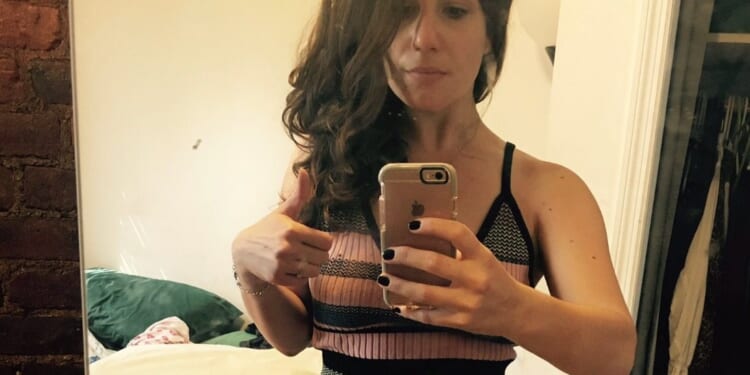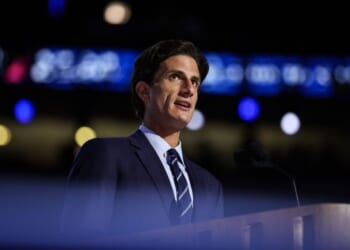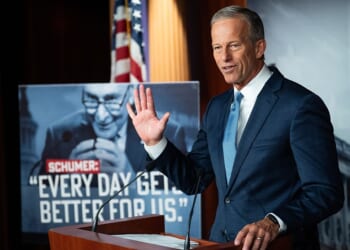You might assume Lauren Duca would be devastated by the demise of Teen Vogue — the politics and fashion site that she once called “a champion of democratic socialism,” and that defined an era of girlboss feminism, culturally sensitive Halloween costumes, AOC tributes, and jeremiads against slut-shaming.
One of her essays for the publication, “Donald Trump Is Gaslighting America,” published in December 2016, detonated at precisely the right instant and midwifed her near-overnight transformation from a pop-culture writer into the #Resistance’s 25-year-old mascot. But the woman that The New Yorker once crowned the “Millennial feminist warrior queen of social media” is feeling ambivalent about this week’s news that publishing giant Condé Nast is folding Teen Vogue into its flagship website, laying off 70% of its staff, and dissolving its politics desk.
Looking back, the now 34-year-old Duca sees her Teen Vogue persona as, well, kind of an asshole. She left the magazine in mid-2018 and spent most of the last six years very offline after experiencing a New Age come-to-Jesus moment (that was also an actual come-to-Jesus moment) on psychedelics.
“I was Little Miss Resistance, an image supported by the mainstream media,” she tells me on Thursday. “I was so young and completely emotionally immature and just obsessed with screaming my opinions at the top of my lungs and thinking that that was, like, helping democracy.” She adds: “sometimes it feels like that whole period was a blackout.”
For many of those who came of age during the late-2010s media-politics cyclone, it’s hard to look back with clarity. The immediate present might feel politically alive, what with the earthquake-like election of Zohran Mandami and the daily disruptions of Trump II. Still, it’s eerily muted compared to the years following Trump’s descent from the golden escalator. From 2016 to 2022, politics — thanks to the omnipresence of social media — felt like electricity running through every surface.
The political theorist Anton Jäger coined a label for it: hyperpolitics, the fusion of celebrity, entertainment, and politics, in which breathless outrage and the expression of your personal and political identity online become a kind of civic participation.
In the era of hyperpolitics, it only seemed strange at first when Teen Vogue went woke. The publication began life in 2003 as a spinoff of Vogue, aimed at teenage fashion consumers under the Condé Nast umbrella. In the wake of Trump’s rise, the magazine that once printed stories such as “Ten Ways to Slay at Prom” was suddenly publishing op-eds on climate justice and white supremacy under headlines such as “9 Climate Activists of Color You Should Know.” Executives at Condé Nast were happy with their brush with relevance among young women, even as critics sneered. But the shift made sense.
Teen Vogue was actually just one of a new wave of websites — Jezebel, Mic, Refinery29 — that served the same restless demographic, who, ironically, weren’t actually teenagers at all but mostly 20- and 30-something women. According to a Washington Examiner report, just 1.7% of Teen Vogue’s May 2018 audience was 17 or younger, and slightly more, 2%, were 18 to 24 years old.
More specifically, the Teen Vogue audience was the kind of economically and culturally ascendant urban, single Millennials soon to become both the Democrats’ most loyal bloc and the Right’s favorite scapegoat. Teen Vogue readers, editors boasted, were no longer just consumers, but now “considered themselves activists.”
Duca did not simply join that moment of hyperpolitics — she was that moment.
Before her viral stardom, Duca was a pop-culture writer, specializing in celebrity profiles and reality-TV analysis. She knew Donald Trump not as a political figure, but a reality-TV character — not that there was much of a difference: Trump accelerated the merging of social media, reality TV, and politics. “I felt qualified to write about [Trump] because he was, in a way, an entertainment product,” Duca says.
What happened after the “Donald Trump Is Gaslighting America” essay has now become media lore. The piece went viral, drawing millions of views and overwhelming Condé Nast’s servers. Duca was told that Anna Wintour nearly fainted on a train, shocked by both the article and the response to it. Overnight, a magazine built to sell eyeliner became a hub for #Resistance politics; its 25-year-old writer got half a million Twitter followers; and cable-news hosts came calling (she became MSNBC’s Millennial whisperer).
Her subsequent showdown with Tucker Carlson remains one of the strangest artifacts of that era. Carlson had invited Duca on his Fox News show to discuss her tweets about Ivanka Trump. Duca barely knew what Fox News was, and even less about the channel’s fiery prime-time pundit.
“I just thought he was that guy with the bowtie,” she recalls. The conversation quickly imploded into mutual contempt — Carlson sneering that she should stick to writing about Ariana Grande’s “thigh-high boots,” Duca rolling her eyes. As her microphone faded out, she mouthed the words “You’re a sexist pig.”
Duca recalls: “my kind of fundamental reaction was, like, is this middle-aged man bullying me on TV? I was just like, ‘Are you serious?’ ” The debate went viral instantly, and within hours, the clip had been viewed millions of times.
Duca felt like she had to keep riding the wave of fame before it crashed, even as spending up to 15 hours a day glued to screens and political narratives was sending her to a darker place: “it wasn’t just your average internet addiction, because I would fire off a hot take, and then a car would come and pick me up and drive me to MSNBC. Like, it was farm-to-table hot takes. And my tweets would be the news for a not insignificant period of time. It was horrible.”
Soon after the Tucker interview, she launched a new column for Teen Vogue called “Thigh-High Politics.” Simon & Schuster signed her to write a book titled How To Start a Revolution: Young People And The Future of Politics — ambitious stuff for someone who, a year earlier, was still writing celebrity-obsessed stories like “Debby Ryan Just Dyed Her Hair Rose Gold.”
That book, published in 2019, now reads like a time capsule of Millennial liberalism: half manifesto, half motivational poster. The title promised radical transformation; the text offered empowerment slogans and civics lessons written in the language of self-care. The idea that posting, educating, and “raising awareness” could amount to transformational change of national politics was the central illusion of the era — and Duca, like her publication, embodied it at the time.
She also paid the price for it. In 2019, the same attention economy that had made her a celebrity turned cannibal. BuzzFeed News published a lengthy and relatively catty exposé about her short-lived teaching gig at New York University. It described her as “both a feminist icon of her generation and a phony quasi-journalist who has taken advantage of a few lucky moments in her life.” Duca was portrayed as self-absorbed, erratic, and obsessed with her own brand. The piece was brutal, and Duca’s name became a punchline in the same corners of the internet that had once celebrated.
But she quietly cheered on her cancellation in a twisted way, she said, even as her personal life collapsed along with her reputation. “I took down the old Lauren completely, you know? This person, essentially my avatar, was floating through hyperspace without my input, and I just didn’t really bother defending her anymore,” she said.
The next half-decade of Duca’s life was a total deconstruction of her old self. She got divorced, became a lesbian, briefly joined a psychedelics cult in South America, suffered “ego death,” almost died, found Jesus, moved from New York to Tucson, Ariz., and, of course‚ logged off the endless scroll. And if that sounds like a comedy bit, well, it kind of is. She’s turned it into a one-woman show about her life, How Embarrassing is Jesus?, playing off Broadway.
Duca in 2025 is an inversion of her old ethos: the once-loud, self-assured political avatar has turned quiet mystic, talking about God, energy, and healing. “I did believe that political action was the driver of a good life,” she tells me. “I had this insatiable energy to be the Millennial feminist warrior queen, and then I didn’t have the energy anymore.”
In many ways, Duca’s decade-long trajectory is an extreme version of the story of the larger Millennial Teen Vogue generation: the first raised entirely online, who experienced politics as a series of viral flashpoints since Trump’s first election in 2016: Bernie rallies, women’s marches, pussy hats, and fist-raising #BLM Instagram graphics. It was addictive, intoxicating, and unsustainable.
Duca once wrote that Trump’s election “made the country spark like an aurora borealis of lightbulb moments.” Even then, she was describing politics as energy rather than institution-building — something to be felt rather than built. Almost a decade later, many who once flooded the streets are now raising children, paying mortgages, practicing mindfulness, or, in Duca’s unusual case, finding Jesus in the form of a praying mantis under the influence of psychedelics.
Teen Vogue is gone. The Lauren Duca who embodied its political moment is gone, too.
a.appcomments {
background: #FFF;
border: 1px solid #446c76 !important;
font-family: benton-sans,sans-serif;
font-weight: 600;
font-style: normal;
font-size: 12px;
color: #446c76 !important;
padding: 12px 50px;
text-transform: uppercase;
letter-spacing: 1.5px;
text-decoration: none;
width: 100%;
display: block;
text-align: center !important;
}



















